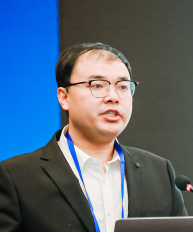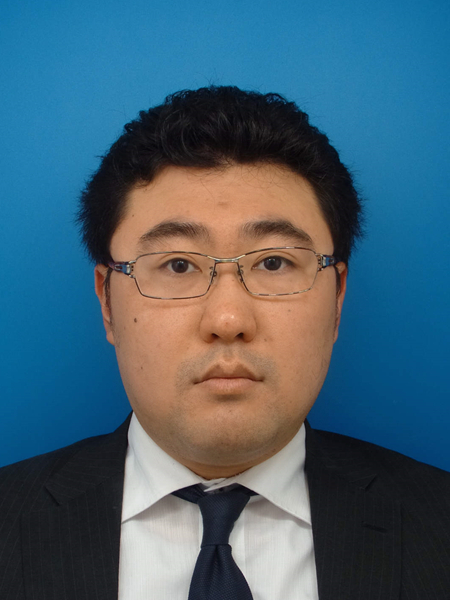Invited Speakers
Guohai Chen
Senior researcher, National Institute of Advanced Industrial Science and Technology (AIST), JapanSpeech Title: Advanced Synthesis of Highly Crystalline Carbon Nanotubes and High Aspect Ratio Structures for Multifunctional Applications
Abstract: The precise synthesis and versatile applications of carbon nanotubes (CNTs) are essential for advancing nanotechnology and leveraging their extraordinary properties across various domains [1, 2]. Machine learning has emerged as a powerful tool in CNT research, enabling optimization of synthesis and application development [3-5]. In this talk, we introduce a machine-learning-assisted approach to address the trade-off between crystallinity and growth efficiency in CNT synthesis [5]. Additionally, by utilizing a multi-step chemical vapor deposition (CVD) reactor combined with atmospheric microplasma, we achieved the production of highly crystalline CNTs [6-8]. In addition to synthesis, we demonstrate the practical applications of CNTs. High aspect ratio (60:1), free-standing, 1.2 mm-tall, 20 μm-diameter vertically aligned CNT post arrays were fabricated [9]. These CNT posts served as neural probes, exhibiting rapid electrochemical responses to methyl viologen and dopamine. Furthermore, they were incorporated into CNT-Cu composites for through-silicon-via interposers, showcasing copper-level electrical conductivity and silicon-level low thermal expansion [10]. Our work highlights the integration of advanced synthesis techniques and precise structural manipulation to address critical challenges in CNT research, including trade-offs in structural control and productivity. These advancements demonstrate the potential of CNTs in diverse applications, driving progress in nanomaterials science.
Keywords: Carbon nanotube, microplasma, crystallinity, neural probe, interposer
Acknowledgements: G.H. Chen acknowledges support from JSPS KAKENHI Grant Number JP23K04552.
Reference:
[1] G. H. Chen, et al., ACS Nano 7 (2013) 10218-10224.
[2] D.-M. Tang, et al., G. H. Chen, et al., Science 374 (2021) 1616-1620.
[3] G. H. Chen, D.-M. Tang, Nanomaterials 14 (2024) 1688.
[4] G. H. Chen, et al. J Mat Sci Technol 231 (2025) 30-35.
[5] D. Lin, et al., G. H. Chen*, ACS Nano 17 (2023) 22821-22829.
[6] T. Tsuji†, G. H. Chen†, et al., Mater Today Chem 44 (2025) 102576.
[7] G. H. Chen, et al., Chem Eng J 444 (2022) 136634.
[8] T. Tsuji†, G. H. Chen†, et al., Nanomaterials 11 (2021) 3461.
[9] G. H. Chen, et al., ACS Biomater Sci Eng 4 (2018) 1900-1907.
[10] G. H. Chen, et al., ACS Appl Nano Mater 4 (2021) 869-876.
Kazuhiro Oda
Professor, Division of Mechanical Engineering, Faculty of Science and Technology, Oita University, JapanSpeech Title: A novel approach to evaluate the singular stress field of interface cracks in orthotropic dissimilar materials using isotropic reference solutions
Abstract: Cracked orthotropic dissimilar plate specimens are often used to evaluate the strength of fiber-reinforced composites. For isotropic dissimilar plates, the stress state is determined by so-called Dundurs parameters α^iso, β^iso. Similar composite parameters are proposed for orthotropic dissimilar plates as α, β, Γ_A, Γ_B, ρ_A, ρ_B. Compared to two parameters in isotropic cases, orthotropic cases have such six independent parameters, making it much more difficult to use previous analysis results and requiring a new analysis each time. In this study, by applying the mesh-independent proportional method the interface edge crack in orthotropic dissimilar materials is widely analyzed considering previous studies. Then, the singular stress field in orthotropic materials is compared with that in the isotropic dissimilar material under the condition α=α^iso, β=β^iso. The results show that the singular stress field in orthotropic dissimilar material can be evaluated within a few percent error in most cases from that in isotropic dissimilar material when α=α^iso, β=β^iso. In this isotropic replacement by applying α=α^iso, β=β^iso, the singular interface stress distributions in orthotropic dissimilar plates can be estimated within the 8% error even in the worst case where the material anisotropy changes significantly.
Keywords : Fracture mechanics, Stress intensity factor, Interface crack, Orthotropic dissimilar materials, Material composite parameters, Dundurs parameters
Xianbin Huang
Associate Professor, School of Petroleum Engineering, China University of Petroleum (East China), ChinaSpeech Title: High Temperature Resistant Polymers for Ultra-deep Well Drilling
Abstract: With the gradual depletion of shallow oil and gas resources, deep (>4,500m) and ultra-deep (>6,000m) oil and gas have become the main focus of oil and gas exploration and development in China. With the advancement of technology, the drilling depth has been gradually increased, and there are more than 200 oil and gas wells exceeding 8000m now in China. It is encouraging that China already has two wells deeper than 10,000 meters, one of which has been completed. However, the high temperature in the deep formation poses a great challenge to the temperature resistance of drilling fluids, which plays a vital role in carrying and suspending dill cuttings, stabilizing wellbores, and lubricating and cooing drill bits during drilling engineering. Water-soluble polymers mainly regulate rheology and control filtration in drilling fluids, but their performance falls under high-temperature and high salts conditions, which is a serious problem for safety and efficiency. This report will focus on the topic of high temperature resistant polymers used in drilling fluids. It will cover the technical challenges of deep well drilling, the challenges for polymers and research on high temperature resistant polymers (filtration control additive and plugging agent) from our team. Finally, the technical challenges that still need to be addressed will be presented.
Rei Takaki
Associate Professor, Department of Mechanical and Electrical Engineering, Nippon Bunri University, JapanSpeech Title: Investigation of the Stepped-lap Joint Strength Improvement Mechanism Based on the ISSF Analysis
Abstract: Step joints have some special features compared to other joints. For example, the joint area is larger than that of an ordinary straight joint, and thus the joint strength can be expected to be improved. Unevenness of the bonding interface can be simulated by changing the number of steps.To clarify the improvement mechanism in stepped joints, this study focused on the singular stress fields as well as the ISSFs, which control the adhesive strength. The initial debonding stress evaluated from the fully bonded stepped joint with a constant ISSF agrees well with the initial debonding stress σ_(c EXP)^Initial. Furthermore, the variation of the second debonding stress σ_c^2nd evaluated from the partially delaminated stepped joint agrees well with the variation of the final fracture stress σ_c^Final. The reason why the final fracture strength σ_(c EXP)^Final is much larger than the initial debonding strength as σ_(c EXP)^Initial≪σ_(c EXP)^Final when N_S≥6 can be explained as follows. The dimensionless ISSF F_σ^B under a constant load in the partially delaminated stepped joint decreases largely with increasing N_s although F_σ^A under a constant load in the fully bonded stepped joint does not change very much.
Lucien Veleva
Associate Professor, Applied Physics Department, Center for Investigation and Advanced Study, MexicoSpeech Title:
Updated soon...





